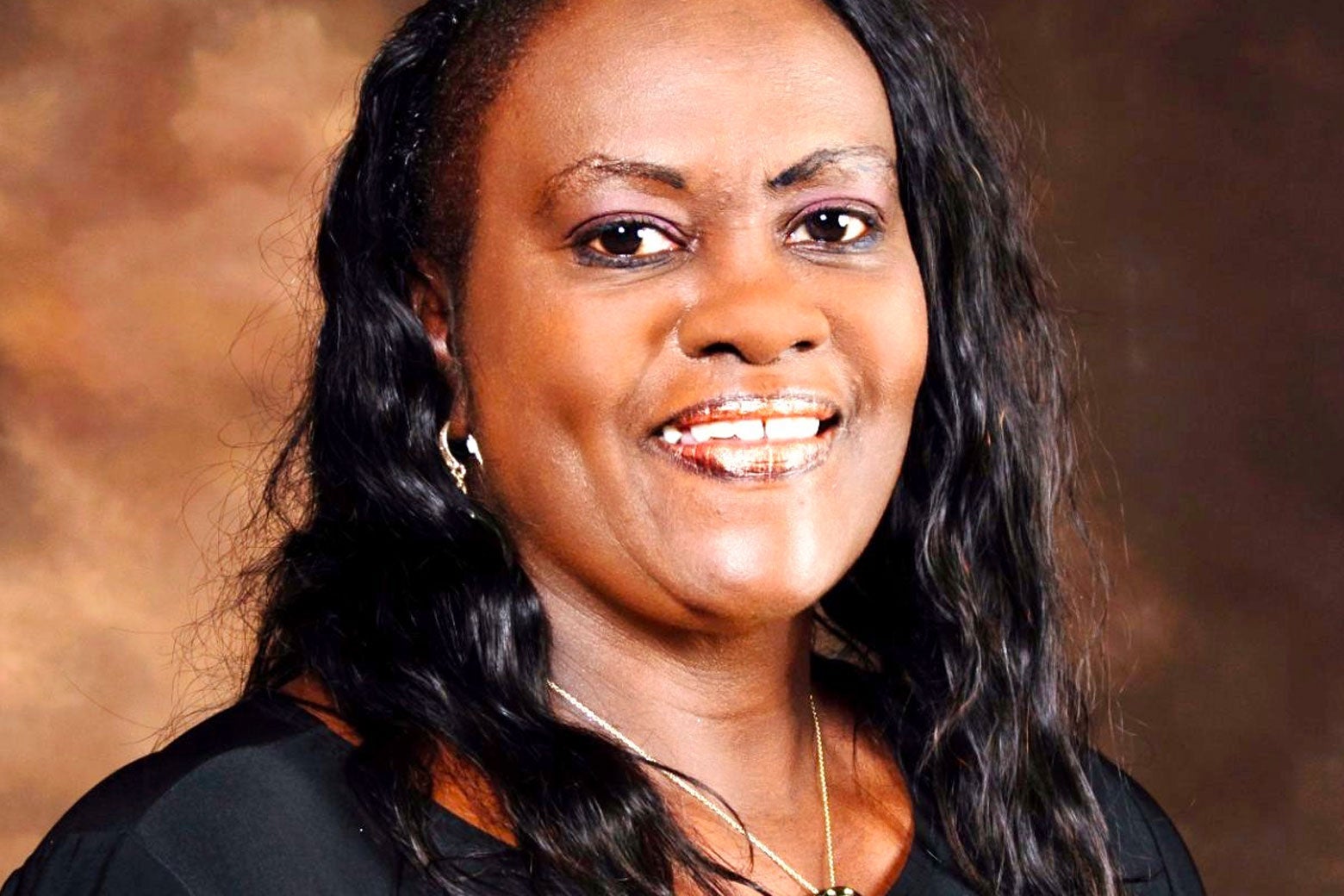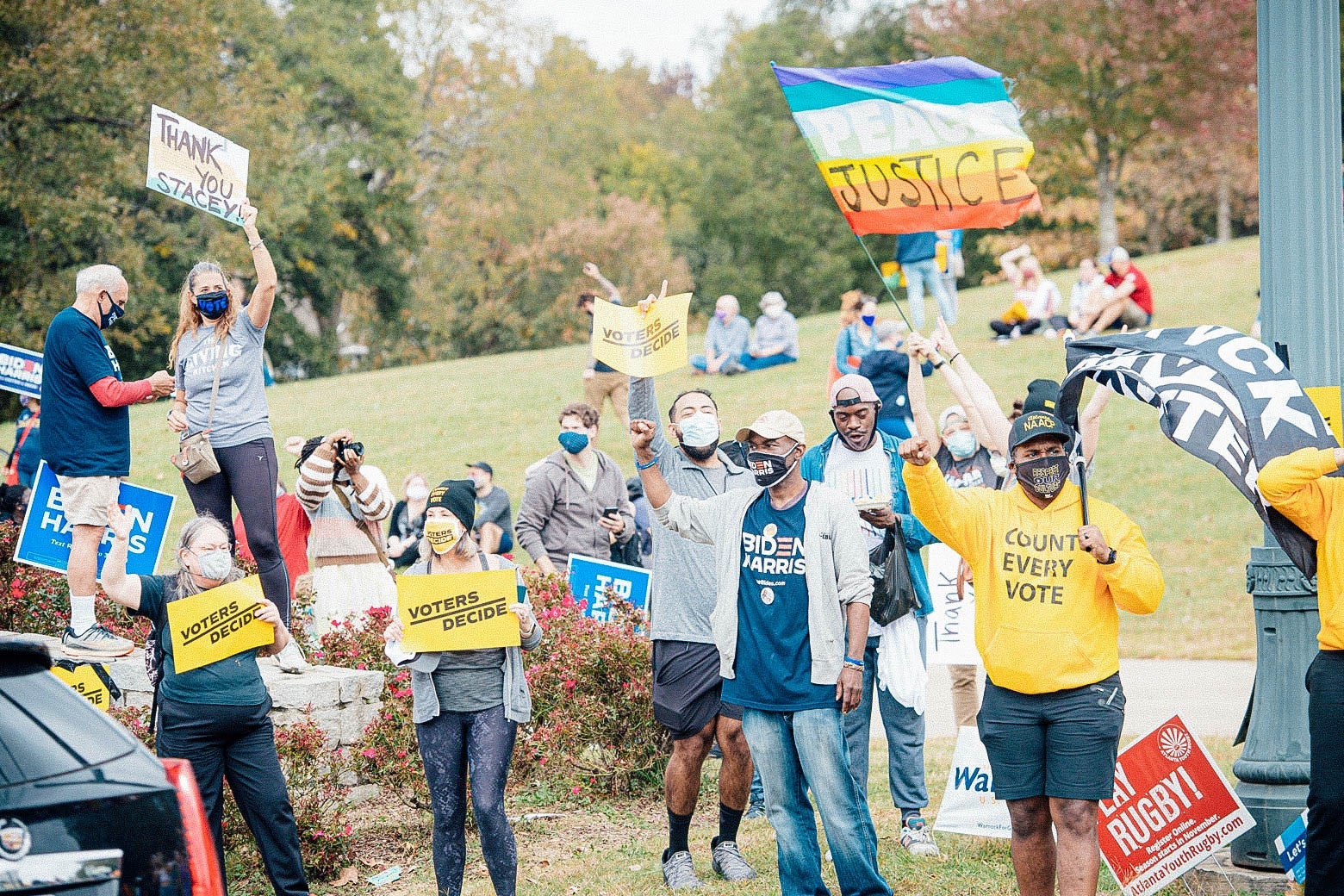When Joe Biden finally pulled ahead of Donald Trump in Georgia on the Friday morning after Election Day, I texted Olivia Pearson, a Black city commissioner and voting rights activist in Douglas, Georgia. I wanted to ask Pearson, 59 and known around the small Coffee County town as “Ms. Libby,” how she felt now that the state appeared ready to turn blue for the first time since 1992, after years of grueling voter registration drives and an array of voter suppression efforts.
Pearson knows better than most about the latter: In 2012, she was charged with felony voter fraud for showing a young first-time Black voter how to use a voting machine. It was a particularly disquieting case, one of only a handful in the state to ever be referred to a prosecutor. Pearson faced up to five years in prison. I covered her first trial, which ended in a mistrial in April 2017. The local prosecutor (who would go on to decide against charging Ahmaud Arbery’s killers) refiled the case. Pearson was acquitted of all charges in her second trial almost a year later. “I still have days when that wears on me,” she told me in May.
But now I figured she would be elated, basking in the rare Democratic Party triumph in a reliably red stronghold like Georgia. She responded to my text about an hour later.
“SURE I would LOVE to talk about it,” Pearson wrote. “AND MY NEW ARREST AT THE POLLS.”

I was surprised Pearson was entangled in another battle at the local ballot box. But I probably shouldn’t have been. The Democratic Party’s hard-fought electoral gains in Georgia, which will be put to the test yet again in January’s two Senate runoff elections, will always be in peril because of the regressive, racist political tactics of the state’s Republicans.
In a state where Republicans hold every elected statewide office, as well as majorities in both the state House and Senate, the Democrats’ get-out-the-vote apparatus was gradually built through the efforts of Black organizers like Pearson. Stacey Abrams inherited—and furthered—this work after her 2018 gubernatorial campaign came up short against then–Secretary of State Brian Kemp amid allegations of rampant voter suppression. In the clearest sign that those GOTV efforts are paying off, Biden added 588,600 voters to Hillary Clinton’s tally in 2016. Exit polling in Georgia shows that Black voters made up 29 percent of the 2020 electorate, and 92 percent of those voters went for Biden.
“None of that happened by accident,” University of Michigan political scientist Vincent Hutchings, whose research includes voting behavior and Black politics, told me. “There were activists on the ground, registering people and urging them to turn out, and all of those things came together.”
That was Pearson on Oct. 27, doing what she always does the week before an election: calling friends and neighbors to see if they had voted. If they hadn’t, Pearson would offer them a ride to the county elections office. That morning, Pearson took a former student to the polls and caught the attention of an old foe: Misty Martin, the elections supervisor for Coffee County.
Pearson told me she had signed the form that allowed her to assist her former student “because I know she is illiterate and can’t read.” But, according to Pearson, Martin rushed in anyway to shoo Pearson away.
“She began hollering and screaming at me, saying, ‘These are my buttons, my machines, don’t touch them,’ ” Pearson said. “I kept asking her questions and she hollered, ‘Call 911.’ ” Pearson and her former student left, but Pearson returned an hour later with another family friend she’d promised to take to the polls. This time, when she pulled into the parking lot, they were met by three police vehicles. One of the officers presented Pearson with a criminal trespass warning.
“What is the reason I have to leave?” Pearson told me she asked the officer. Martin came outside and the two women went back and forth again before the officers arrested Pearson and placed her in handcuffs.
“Ms. Pearson was asking for her rights,” said Rolanda Williams, the 40-year-old woman whom Pearson took to the polls. “As they arrested her, they had her arms kinda twisted. You could tell by her eyes that she was in pain.”
Pearson was booked into the Coffee County Jail, where she was charged with criminal trespass, a misdemeanor. She was released a few hours later. Neither Martin nor the county elections board chairman replied to my several requests for comment.
“They’re determined to keep me from trying to do this,” Pearson told me of her efforts to help her Black neighbors vote. “I bet you some people did not vote because of my experience.”
Pearson’s arrest appears to be part of a long history of hostility toward Black residents in the area. A town of about 12,000 two hours north of Jacksonville and three hours south of Atlanta, Douglas was named after Abraham Lincoln’s opponent for the presidency (no Coffee County resident cast a vote for Lincoln in 1860). Coffee County was named for a cotton plantation owner, and a soaring monument to Confederate soldiers now sits out in front of the county courthouse.
Today, most of the county’s Black residents live in Douglas, where they make up half of the population. It’s a hard place to make a living—the largest employer in the area is Walmart and the second-largest is a peanut shelling warehouse. Douglas’ median household income of $29,519 is nearly half of Georgia’s, and its poverty rate, 30.6 percent, more than twice the state’s. As of 2017, the town’s Black residents had a poverty rate nearly twice that of its white ones.
In Coffee County, defending Black voting rights has been an ongoing fight. In 1904, two local political parties teamed up to institute a white-only primary. In 1946, every Black voter in Coffee County was purged from the rolls in a gubernatorial election that ended with the victory of avowed segregationist Eugene Talmadge. And in the late 1970s, a group that included Pearson’s mother—a top local NAACP official and civil rights activist—had to sue Douglas to gain more Black political representation.
I called Rebecca DeHart, the CEO of Fair Count, a Georgia-based nonprofit that was helping to track down provisional and paper ballots across the state, to ask her about voter registration and turnout efforts this election cycle. When I briefly mentioned the plight of Pearson in Coffee County, DeHart perked up. “There’s a couple of counties that are always on my mind,” said DeHart, who used to be the executive director of the state’s Democratic Party.
It was the Georgia Democratic Party that dispatched Massachusetts attorney (and coffee company owner) Dean Cycon to Douglas after he told them about his experience monitoring elections at Indian reservations across the country. “I told them, don’t be afraid to put me someplace where you think you need the ability to … stand up,” Cycon told me. “Then I did a little research [on Coffee County] and one of the first things that came up was Ms. Pearson. I’ve seen this play over and over again on Indian reservations. People get shafted by local powers that be and have little recourse.”
Cycon said he, too, faced resistance when he arrived in town. He said he was initially told poll watchers weren’t allowed in Douglas and then later told the Democratic Party hadn’t sent in the proper forms for him to observe on Election Day. Eventually, he said, the county elections office allowed him to freely move around and assist voters.
“They kinda warmed up and were friendly and didn’t inhibit me at all after I stood up and advocated for myself,” Cycon said. “Because I know most people in those situations are cowed. I’m a lawyer. I know better than that.”
As for Pearson, she continued her efforts to take voters to the polls the week after her arrest. She parked in a lot across the street from the elections office and let people out there.
Pearson’s court date is scheduled for Dec. 21. But she was looking past that to Jan. 5 — the date of the runoff elections that will determine control of the Senate. When we talked, she was already tossing around ideas for how to keep voters excited about the political possibilities, even in a county Trump won by 40 percentage points and where no Democratic candidate earned more than 33.6 percent of the vote.
“I was just thinking today,” Pearson told me, “You’ve got to push, push, push on trying to get the voters back.”

